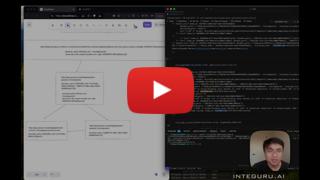https://github.com/integuru-ai/integuru
The first AI agent that builds permissionless integrations through reverse engineering platforms' internal APIs.
https://github.com/integuru-ai/integuru
agent agents ai-agent ai-agents api apis automation integration integrations llm open-source openapi robotic-process-automation rpa unofficial-api unofficial-apis
Last synced: 9 months ago
JSON representation
The first AI agent that builds permissionless integrations through reverse engineering platforms' internal APIs.
- Host: GitHub
- URL: https://github.com/integuru-ai/integuru
- Owner: Integuru-AI
- License: agpl-3.0
- Created: 2024-10-22T23:11:25.000Z (over 1 year ago)
- Default Branch: main
- Last Pushed: 2025-02-13T22:55:29.000Z (about 1 year ago)
- Last Synced: 2025-04-29T13:13:34.094Z (10 months ago)
- Topics: agent, agents, ai-agent, ai-agents, api, apis, automation, integration, integrations, llm, open-source, openapi, robotic-process-automation, rpa, unofficial-api, unofficial-apis
- Language: Python
- Homepage: https://integuru.ai
- Size: 13.2 MB
- Stars: 4,325
- Watchers: 36
- Forks: 339
- Open Issues: 11
-
Metadata Files:
- Readme: README.md
- License: LICENSE
Awesome Lists containing this project
README
# Integuru
An AI agent that generates integration code by reverse-engineering platforms' internal APIs.
## Integuru in Action

## What Integuru Does
You use ```create_har.py``` to generate a file containing all browser network requests, a file with the cookies, and write a prompt describing the action triggered in the browser. The agent outputs runnable Python code that hits the platform's internal endpoints to perform the desired action.
## How It Works
Let's assume we want to download utility bills:
1. The agent identifies the request that downloads the utility bills.
For example, the request URL might look like this:
```
https://www.example.com/utility-bills?accountId=123&userId=456
```
2. It identifies parts of the request that depend on other requests.
The above URL contains dynamic parts (accountId and userId) that need to be obtained from other requests.
```
accountId=123 userId=456
```
3. It finds the requests that provide these parts and makes the download request dependent on them. It also attaches these requests to the original request to build out a dependency graph.
```
GET https://www.example.com/get_account_id
GET https://www.example.com/get_user_id
```
4. This process repeats until the request being checked depends on no other request and only requires the authentication cookies.
5. The agent traverses up the graph, starting from nodes (requests) with no outgoing edges until it reaches the master node while converting each node to a runnable function.
## Features
- Generate a dependency graph of requests to make the final request that performs the desired action.
- Allow input variables (for example, choosing the YEAR to download a document from). This is currently only supported for graph generation. Input variables for code generation coming soon!
- Generate code to hit all requests in the graph to perform the desired action.
## Setup
1. Set up your OpenAI [API Keys](https://platform.openai.com/account/api-keys) and add the `OPENAI_API_KEY` environment variable. (We recommend using an account with access to models that are at least as capable as OpenAI o1-mini. Models on par with OpenAI o1-preview are ideal.)
2. Install Python requirements via poetry:
```
poetry install
```
3. Open a poetry shell:
```
poetry shell
```
4. Register the Poetry virtual environment with Jupyter:
```
poetry run ipython kernel install --user --name=integuru
```
5. Run the following command to spawn a browser:
```
poetry run python create_har.py
```
Log into your platform and perform the desired action (such as downloading a utility bill).
6. Run Integuru:
```
poetry run integuru --prompt "download utility bills" --model
```
You can also run it via Jupyter Notebook `main.ipynb`
**Recommended to use gpt-4o as the model for graph generation as it supports function calling. Integuru will automatically switch to o1-preview for code generation if available in the user's OpenAI account.**
## Usage
After setting up the project, you can use Integuru to analyze and reverse-engineer API requests for external platforms. Simply provide the appropriate .har file and a prompt describing the action that you want to trigger.
```
poetry run integuru --help
Usage: integuru [OPTIONS]
Options:
--model TEXT The LLM model to use (default is gpt-4o)
--prompt TEXT The prompt for the model [required]
--har-path TEXT The HAR file path (default is
./network_requests.har)
--cookie-path TEXT The cookie file path (default is
./cookies.json)
--max_steps INTEGER The max_steps (default is 20)
--input_variables ...
Input variables in the format key value
--generate-code Whether to generate the full integration
code
--help Show this message and exit.
```
## Running Unit Tests
To run unit tests using `pytest`, use the following command:
```
poetry run pytest
```
## Continuous Integration (CI) Workflow
This repository includes a CI workflow using GitHub Actions. The workflow is defined in the `.github/workflows/ci.yml` file and is triggered on each push and pull request to the `main` branch. The workflow performs the following steps:
1. Checks out the code.
2. Sets up Python 3.12.
3. Installs dependencies using `poetry`.
4. Runs tests using `pytest`.
## Note on 2FA
When the destination site uses two-factor authentication (2FA), the workflow remains the same. Ensure that you complete the 2FA process and obtain the cookies/auth tokens/session tokens after 2FA. These tokens will be used in the workflow.
## Demo
[](https://www.youtube.com/watch?v=7OJ4w5BCpQ0)
## Contributing
Contributions to improve Integuru are welcome. Please feel free to submit issues or pull requests on the project's repository.
## Info
Integuru is built by Integuru.ai. Besides our work on the agent, we take custom requests for new integrations or additional features for existing supported platforms. We also offer hosting and authentication services. If you have requests or want to work with us, reach out at richard@integuru.ai.
We open-source unofficial APIs that we've built already. You can find them [here](https://github.com/Integuru-AI/APIs-by-Integuru).
## Privacy Policy
### Data Storage
Collected data is stored locally in the `network_requests.har` and `cookies.json` files.
### LLM Usage
The tool uses a cloud-based LLM (OpenAI's GPT-4o and o1-preview models).
### LLM Training
The LLM is not trained or improved by the usage of this tool.